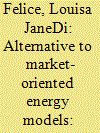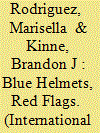|
|
|
Sort Order |
|
|
|
Items / Page
|
|
|
|
|
|
|
| Srl | Item |
| 1 |
ID:
163568


|
|
|
|
|
| Summary/Abstract |
From a biophysical perspective, energy is central to the behaviour of social-ecological systems. Its ubiquity means that energy is entangled with nexus elements, including water, land, emissions and labour. At the science-policy interface, large market-oriented energy models dominate as the tool to inform decision-making. The outputs of these models are used to shape policies, but strongly depend on sets of assumptions that are not available for deliberation and gloss over uncertainties. Taking an approach from complexity, we propose an alternative to market-oriented energy models, describing the behaviour of energy systems in relation to patterns of nexus elements across hierarchical levels. Three characteristics are central to the approach: (i) the distinction of the model's building blocks into functional and structural elements; (ii) their hierarchical organisation and (iii) the description of nexus patterns at each level, through the tool of the processor. To illustrate the model, it is applied to Catalonia's energy sector, linking production and consumption patterns. The framework may help inform stakeholder deliberation on pressing energy and nexus issues.
|
|
|
|
|
|
|
|
|
|
|
|
|
|
|
|
| 2 |
ID:
168552


|
|
|
|
|
| Summary/Abstract |
United Nations peacekeeping soldiers commit atrocities while deployed despite their mandate to protect civilians from harm. Yet, there is tremendous variation across missions in reported human rights abuses. Why are some missions more susceptible to misconduct than others? To answer this puzzle, we identify three broad sources of influence on peacekeeper behavior: institutions, society, and military culture. Using newly collected data, we find that host-country and contributing-country institutions, particularly press freedoms and rule of law, dramatically decrease violations. Compliance with international humanitarian law also decreases violations, though to a lesser degree than institutions. Societal influences, such as gender norms and income inequality, have virtually no impact on abuses. We illustrate the utility of these findings by generating out-of-sample predictions for hypothetical peacekeeping missions in countries with recent political turmoil.
|
|
|
|
|
|
|
|
|
|
|
|
|
|
|
|
| 3 |
ID:
193567


|
|
|
|
|
| Summary/Abstract |
This article presents the various challenges in the current system of AI governance and the correlation between data, algorithm, technology, governance, and geopolitics surrounding its successful implementation. The focal point of the article is the Adaptive-Hybrid AI Governance framework based on technical, ethical, and societal regulatory mechanisms that models trustworthy AI and the risks associated with it. The article highlights the need for trustworthy AI and how major countries are shaping their AI regulatory mechanisms. It presents a case study on AI governance in defence that elucidates ethical AI governance through various use cases.
|
|
|
|
|
|
|
|
|
|
|
|
|
|
|
|
|
|
|
|
|